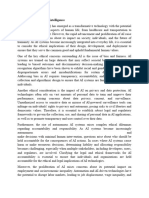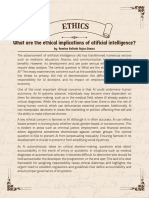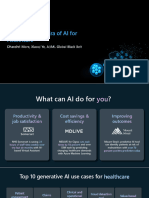Ethical Considerations in AI: Navigating the Moral Landscape of Technology
Ethical Considerations in AI: Navigating the Moral Landscape of Technology
Uploaded by
kinarofelix12Copyright:
Available Formats
Ethical Considerations in AI: Navigating the Moral Landscape of Technology
Ethical Considerations in AI: Navigating the Moral Landscape of Technology
Uploaded by
kinarofelix12Copyright
Available Formats
Share this document
Did you find this document useful?
Is this content inappropriate?
Copyright:
Available Formats
Ethical Considerations in AI: Navigating the Moral Landscape of Technology
Ethical Considerations in AI: Navigating the Moral Landscape of Technology
Uploaded by
kinarofelix12Copyright:
Available Formats
Ethical Considerations in AI: Navigating the Moral
Landscape of Technology
Artificial Intelligence (AI) has rapidly become one of the most transformative forces of the 21st
century, influencing industries ranging from healthcare to finance, education, and entertainment.
While AI offers enormous potential to improve human lives, it also raises significant ethical
challenges that need to be addressed to ensure its responsible development and deployment. These
ethical considerations are crucial for ensuring that AI serves humanity’s best interests and does not
inadvertently cause harm. In this article, we will explore key ethical issues in AI, focusing on
fairness, transparency, accountability, privacy, and the long-term societal impact of these
technologies.
1. Bias and Fairness
One of the most significant ethical concerns in AI is the risk of bias. AI systems, especially machine
learning algorithms, learn from data—often vast amounts of data that reflect the behaviors,
decisions, and attitudes of humans. If the data used to train these systems contain biases (whether
intentional or not), the AI can perpetuate or even amplify these biases in its predictions and
decisions.
For example, AI algorithms used in hiring processes may unintentionally favor candidates from
certain demographic backgrounds while disadvantaging others, based on historical data patterns.
Similarly, facial recognition systems have been shown to have higher error rates for people of color,
particularly Black and Asian individuals, compared to white people.
The ethical challenge lies in ensuring that AI systems are fair and do not discriminate based on race,
gender, age, or other protected characteristics. Tackling AI bias requires a multifaceted approach,
including diverse datasets, transparency in algorithm design, and continuous monitoring of AI
outputs to identify and correct bias.
2. Transparency and Explainability
As AI systems grow more complex, one of the ethical issues that arises is the lack of transparency
and explainability. Many AI models, particularly deep learning networks, operate as "black boxes,"
making it difficult for humans to understand how decisions are made. This opacity poses significant
risks, especially in high-stakes areas such as healthcare, criminal justice, and finance, where
decisions made by AI systems can have profound consequences for individuals' lives.
For instance, in the context of healthcare, an AI might recommend a particular treatment for a
patient based on an analysis of medical data. However, if the reasoning behind this recommendation
cannot be easily explained, doctors and patients may have difficulty trusting or verifying the
decision. This lack of explainability can lead to a "trust gap," where people are unwilling to rely on
AI, even if it is technically effective.
Ethically, AI systems should be transparent and explainable to ensure that users and stakeholders
can understand and evaluate the decision-making process. This fosters accountability, builds trust,
and enables informed consent, where individuals are aware of how AI is influencing their lives.
3. Accountability
Who is responsible when AI systems make errors or cause harm? This is a key ethical question,
especially as AI systems become more autonomous. If an autonomous vehicle causes an accident,
for example, who is to blame—the manufacturer, the developer, or the user? Similarly, if an AI
algorithm makes an unjust decision in a courtroom or in a hiring process, how do we assign
responsibility?
The issue of accountability in AI is complicated by the fact that many AI systems operate without
direct human oversight or interaction. To address this, it is crucial to establish clear guidelines for
accountability. This includes ensuring that developers, companies, and organizations are responsible
for the ethical design, testing, and deployment of AI systems. Additionally, there should be
mechanisms in place for individuals to seek redress when AI systems cause harm or violate their
rights.
4. Privacy and Data Protection
AI systems rely heavily on vast amounts of data to function effectively. While this data can be used
to improve efficiency, it also raises significant concerns about privacy and data protection. AI
systems may process sensitive personal information, such as health records, financial transactions,
and personal communications, which can be vulnerable to misuse if not handled properly.
The ethical challenge is ensuring that AI systems respect individual privacy and comply with data
protection laws, such as the European Union's General Data Protection Regulation (GDPR). It is
essential that data is collected and used transparently, with informed consent from individuals, and
that there are safeguards in place to prevent unauthorized access or misuse.
Moreover, as AI systems become more sophisticated, there is a growing concern about the potential
for surveillance. AI-powered surveillance tools, including facial recognition and behavioral
analysis, can infringe on privacy rights if used without proper regulation. Ethical AI design must
balance the need for data with the protection of personal privacy.
5. Impact on Employment and Economic Inequality
AI's ability to automate tasks traditionally performed by humans has the potential to significantly
disrupt labor markets. From manufacturing to customer service, AI systems are increasingly
replacing jobs, particularly those that involve repetitive or routine tasks. While automation can
increase efficiency and productivity, it also raises concerns about job displacement and economic
inequality.
The ethical issue here revolves around how to ensure that the benefits of AI-driven automation are
shared equitably. Governments, businesses, and other stakeholders must consider the societal
impact of AI, particularly on vulnerable populations. Strategies to address these challenges might
include reskilling and upskilling workers, creating new job opportunities in AI-related fields, and
providing safety nets for those displaced by automation.
Furthermore, AI could exacerbate economic inequality if the wealth generated by AI is concentrated
in the hands of a few large corporations or wealthy individuals. Ethical AI development should
involve policies and practices that ensure broad access to the benefits of AI while minimizing the
risks of deepening economic divides.
6. Autonomy and Human Dignity
AI's growing capabilities also raise concerns about the erosion of human autonomy and dignity. If
AI systems take over more aspects of decision-making, from healthcare to legal judgments, there is
a risk that humans could become passive recipients of decisions made by machines. In extreme
cases, AI could make choices that limit individuals' freedom or violate their dignity.
For example, AI systems used in social media platforms can influence what content people see,
which can shape their opinions and behaviors. In healthcare, AI-driven diagnostics and treatment
recommendations may influence critical decisions about a person's body and health without fully
considering their preferences or desires.
Ethically, AI systems must be designed to respect human autonomy and dignity. This means that AI
should complement human decision-making rather than replace it, and individuals should always
have the right to make informed choices about how AI affects their lives.
7. Long-term Societal Impacts and the Risk of Autonomy
Looking toward the future, there are also concerns about the long-term societal impact of AI,
particularly as we develop more advanced, autonomous systems. The idea of "superintelligence"—
an AI that surpasses human intelligence—raises existential risks if such systems operate outside of
human control. The ethical questions here are profound: how do we ensure that advanced AI
remains aligned with human values, and what safeguards should be in place to prevent AI from
causing harm?
While we are still far from creating superintelligent AI, these concerns highlight the importance of
proactive thinking in AI ethics. Establishing ethical frameworks and regulatory oversight now can
help prevent the development of dangerous AI systems in the future.
Conclusion
AI technology holds the potential to revolutionize society for the better, but it also presents
significant ethical challenges that must be carefully addressed. Issues of bias, transparency,
accountability, privacy, and human dignity are just a few of the many concerns that need to be
prioritized in AI development. By taking a responsible, ethical approach to AI design and
deployment, we can ensure that AI technologies are aligned with human values and contribute to a
more equitable and just society. As AI continues to evolve, it is crucial that we continue to engage in
ethical discourse and thoughtful policymaking to guide its development and use.
You might also like
- Appeal To Texas Supreme CourtDocument11 pagesAppeal To Texas Supreme CourtHouston ChronicleNo ratings yet
- Text of Texas House Bill 4 (2023)Document3 pagesText of Texas House Bill 4 (2023)Daily Caller News FoundationNo ratings yet
- Quiz NewDocument119 pagesQuiz NewMonyNaguNo ratings yet
- 5000 French Words MemriseDocument84 pages5000 French Words Memrisenita Takocs100% (1)
- Memorandum in Support of Opposition To Motion To DismissDocument33 pagesMemorandum in Support of Opposition To Motion To DismissBasseemNo ratings yet
- Correlation, Causation, Motivation, and Second Language Acquisition PDFDocument15 pagesCorrelation, Causation, Motivation, and Second Language Acquisition PDFmengying zhangNo ratings yet
- Oregon Child CustodyDocument7 pagesOregon Child CustodyGracie Allen0% (1)
- Moore & Mealy MachineDocument29 pagesMoore & Mealy Machineapi-382894094% (16)
- Exploring The Use of Chatgpt As A Tool For Learning and Assessment in Undergraduate Computer Science Curriculum: Opportunities and ChallengesDocument8 pagesExploring The Use of Chatgpt As A Tool For Learning and Assessment in Undergraduate Computer Science Curriculum: Opportunities and ChallengesKwok Chun WongNo ratings yet
- SUPPORT DOCUMENT THE USA INC IS HIDING -Let's Talk about the POST OFFICE AND HOW THEY GOT BUSTED COMMITTING FRAUD WITH THE DOD, DOJ and ETC TO COVER THE USA INC's TREASONDocument924 pagesSUPPORT DOCUMENT THE USA INC IS HIDING -Let's Talk about the POST OFFICE AND HOW THEY GOT BUSTED COMMITTING FRAUD WITH THE DOD, DOJ and ETC TO COVER THE USA INC's TREASONSue BozgozNo ratings yet
- Corporations Are The Illegal As Per 1870 Void Ab Initio Act and They Know It Especially HillsboroughDocument713 pagesCorporations Are The Illegal As Per 1870 Void Ab Initio Act and They Know It Especially HillsboroughSue BozgozNo ratings yet
- Practice Makes Perfect - Italia Setence BuilderDocument213 pagesPractice Makes Perfect - Italia Setence Buildervianny.rubioNo ratings yet
- ICD10 Testing Scenario RheuDocument3 pagesICD10 Testing Scenario RheuO.r. CadzNo ratings yet
- Yes, The Usa Inc Will Kill You 15 Jan 2025Document570 pagesYes, The Usa Inc Will Kill You 15 Jan 2025Sue BozgozNo ratings yet
- Training Material 1Document8 pagesTraining Material 1anshusaini706034No ratings yet
- Test of Essential Academic Skills (TEAS) Study GuideDocument20 pagesTest of Essential Academic Skills (TEAS) Study GuideMcRee Learning CenterNo ratings yet
- Download full Medical Billing and Coding Demystified Second Edition Marilyn Burgos - eBook PDF ebook all chaptersDocument62 pagesDownload full Medical Billing and Coding Demystified Second Edition Marilyn Burgos - eBook PDF ebook all chaptersnchixfecrin100% (1)
- Ethics in ResearchDocument39 pagesEthics in Researchdavidluke1979No ratings yet
- Flashcards About Coding Test 1Document4 pagesFlashcards About Coding Test 1Srikanth PagidiNo ratings yet
- The DOJ Is Corrupt As Hell and Here Is The Proof - Main DocumentDocument943 pagesThe DOJ Is Corrupt As Hell and Here Is The Proof - Main DocumentSue BozgozNo ratings yet
- What Is A DatabaseDocument2 pagesWhat Is A DatabaseJennyrose LacorteNo ratings yet
- Ethical Issues in Geriatrics A Guide For CliniciansDocument9 pagesEthical Issues in Geriatrics A Guide For CliniciansThanc FishNo ratings yet
- Learn Teach Analytical Geometry On A SpreadsheetDocument9 pagesLearn Teach Analytical Geometry On A SpreadsheetKamran JavedNo ratings yet
- The Book of Joel Bible Letter GuzikDocument24 pagesThe Book of Joel Bible Letter GuzikCharles Ghati100% (1)
- 5 8312 Conviction of Certain OffensesDocument4 pages5 8312 Conviction of Certain OffensestruthhurtsinillinoisNo ratings yet
- The Impact of Artificial Intelligence On SocietyDocument2 pagesThe Impact of Artificial Intelligence On Societychristine100% (1)
- CHC Exam Prep Latest 2024 Actual Exam 400 Questions With Verified Detailed Answers (Graded A+)Document86 pagesCHC Exam Prep Latest 2024 Actual Exam 400 Questions With Verified Detailed Answers (Graded A+)nyakshangel3100% (1)
- Medical Billing Terminology and MeaningsDocument7 pagesMedical Billing Terminology and MeaningsMarynaNo ratings yet
- Chapter 1 - Answer KeyDocument11 pagesChapter 1 - Answer KeyFlorence TangNo ratings yet
- Claim FormDocument3 pagesClaim FormInvestor ProtegeNo ratings yet
- Billing DocumentDocument13 pagesBilling Documentsharma9.kashish9No ratings yet
- Basic Pharmacology For Nurses 15th Edition by Bruce D. Clayton - Test BankDocument33 pagesBasic Pharmacology For Nurses 15th Edition by Bruce D. Clayton - Test Bankarlinec1trNo ratings yet
- EPIC Generative AI White Paper May2023Document86 pagesEPIC Generative AI White Paper May2023Haiyun ChenNo ratings yet
- The Divine Constitution of Moorish AmericaDocument1 pageThe Divine Constitution of Moorish AmericaAmen SunofraNo ratings yet
- Northern New Mexicans v. United States, 10th Cir. (2017)Document10 pagesNorthern New Mexicans v. United States, 10th Cir. (2017)Scribd Government DocsNo ratings yet
- Supporting Documents for 27 Dec ref: Why did the USA INC stand up an illegal business in FL in 1925 was the mission to HUMAN TRAFFICKING FLESH TRAFFICKING? READ JUSTICE ANNA's Illegal and unlawful Securitization Fraud then ask yourself what the QUEEN did with the 10 missing children in CANADADocument896 pagesSupporting Documents for 27 Dec ref: Why did the USA INC stand up an illegal business in FL in 1925 was the mission to HUMAN TRAFFICKING FLESH TRAFFICKING? READ JUSTICE ANNA's Illegal and unlawful Securitization Fraud then ask yourself what the QUEEN did with the 10 missing children in CANADASue BozgozNo ratings yet
- Arbitration: A. Introduction B. The Past Attitude of The Courts Towards ArbitrationDocument10 pagesArbitration: A. Introduction B. The Past Attitude of The Courts Towards Arbitrationsuperxl2009No ratings yet
- Critical Thinking - The Disposition Toward Critical ThinkingDocument38 pagesCritical Thinking - The Disposition Toward Critical ThinkingScott CarlesNo ratings yet
- Tutorial 1: Introduction To Microsoft (MS) AccessDocument27 pagesTutorial 1: Introduction To Microsoft (MS) Accessharishkumarty100% (1)
- Can Everybody Learn To CodeDocument10 pagesCan Everybody Learn To Codemariana henteaNo ratings yet
- US Internal Revenue Service: p596 - 1998Document28 pagesUS Internal Revenue Service: p596 - 1998IRSNo ratings yet
- 15 Jan 2025 ADocument843 pages15 Jan 2025 ASue Bozgoz0% (1)
- Understanding Property Law: by John G. SpranklingDocument12 pagesUnderstanding Property Law: by John G. SpranklingSushil JindalNo ratings yet
- Symmetric EncryptionDocument20 pagesSymmetric Encryption612923204002No ratings yet
- Rule of LAWDocument25 pagesRule of LAWgurpreetNo ratings yet
- Trigonometry SheetDocument4 pagesTrigonometry SheetKelah AligNo ratings yet
- Cooper V Berger Decision Released March 12, 2024Document7 pagesCooper V Berger Decision Released March 12, 2024Jordan SchraderNo ratings yet
- Chapter 1 - LawDocument29 pagesChapter 1 - Lawkanak367No ratings yet
- Artificial Intelligence and Ethics - Navigating The Complex TerrainDocument2 pagesArtificial Intelligence and Ethics - Navigating The Complex Terrainshirsendukar5No ratings yet
- The Ethical Implications of Artificial Intelligence in SocietyDocument2 pagesThe Ethical Implications of Artificial Intelligence in Societybe10253.19No ratings yet
- class notes 6Document1 pageclass notes 6Chaithanya Abhishek.BNo ratings yet
- The Ethics of Artificial Intelligence - Balancing Innovation and ResponsibilityDocument3 pagesThe Ethics of Artificial Intelligence - Balancing Innovation and Responsibilitydragonguy6622No ratings yet
- kkkkkDocument3 pageskkkkkhashimharoon8907No ratings yet
- The Effects of Uncontrolled AI: Navigating the Future of TechnologyDocument3 pagesThe Effects of Uncontrolled AI: Navigating the Future of Technologykinarofelix12No ratings yet
- New Microsoft Word Document (9)Document2 pagesNew Microsoft Word Document (9)rashidmkabirNo ratings yet
- 4Document2 pages4Hüseyin Sezer YıldırımNo ratings yet
- The Ethics of Artificial Intelligence and Its Potential Impact On SocietyDocument1 pageThe Ethics of Artificial Intelligence and Its Potential Impact On Societychristiansumalpong422No ratings yet
- The Ethics of Artificial IntelligenceDocument2 pagesThe Ethics of Artificial IntelligenceNamNo ratings yet
- Documento A4 Portada Trabajo Final de Carrera Recortes Aesthetic Handmade A Mano Formas GrisDocument2 pagesDocumento A4 Portada Trabajo Final de Carrera Recortes Aesthetic Handmade A Mano Formas Grisrojasromina179No ratings yet
- The Ethics of Artificial IntelligenceDocument1 pageThe Ethics of Artificial IntelligenceJuwana ManNo ratings yet
- Mma0003 Final ProjectDocument3 pagesMma0003 Final ProjectviencalipcoNo ratings yet
- Pulmonary EmbolismDocument3 pagesPulmonary Embolismkinarofelix12No ratings yet
- Coronary Artery Bypass Grafting (CABG)Document4 pagesCoronary Artery Bypass Grafting (CABG)kinarofelix12No ratings yet
- Automation in Software Coding: Redefining the Developer's RoleDocument3 pagesAutomation in Software Coding: Redefining the Developer's Rolekinarofelix12No ratings yet
- Causes of Gene MutationDocument3 pagesCauses of Gene Mutationkinarofelix12No ratings yet
- SOA Assignment BriefDocument4 pagesSOA Assignment Briefkinarofelix12No ratings yet
- Understanding Heart FailureDocument4 pagesUnderstanding Heart Failurekinarofelix12No ratings yet
- Understanding DiabetesDocument4 pagesUnderstanding Diabeteskinarofelix12No ratings yet
- Effects of Gene MutationDocument3 pagesEffects of Gene Mutationkinarofelix12No ratings yet
- Understanding LeukemiaDocument4 pagesUnderstanding Leukemiakinarofelix12No ratings yet
- The Art and Science of Plastic SurgeryDocument4 pagesThe Art and Science of Plastic Surgerykinarofelix12No ratings yet
- The Israel-Hamas War: A Complex Conflict With Deep Historical RootsDocument3 pagesThe Israel-Hamas War: A Complex Conflict With Deep Historical Rootskinarofelix12No ratings yet
- Gene and Chromosomal MutationsDocument2 pagesGene and Chromosomal Mutationskinarofelix12No ratings yet
- Understanding Vehicle Transmission in Hybrid CarsDocument2 pagesUnderstanding Vehicle Transmission in Hybrid Carskinarofelix12No ratings yet
- U.S. v. Nixon: A Landmark Case in American Constitutional LawDocument2 pagesU.S. v. Nixon: A Landmark Case in American Constitutional Lawkinarofelix12No ratings yet
- INSTRUCTIONS21Document7 pagesINSTRUCTIONS21kinarofelix12No ratings yet
- Aspects of Artificial IntelligenceDocument1 pageAspects of Artificial Intelligencekinarofelix12No ratings yet
- Course Hero 6Document1 pageCourse Hero 6kinarofelix12No ratings yet
- AI and Machine Learning BooksDocument1 pageAI and Machine Learning Bookskinarofelix12No ratings yet
- Bible ClassDocument1 pageBible Classkinarofelix12No ratings yet
- User Interface - Hall of Fame / Shame: Introduction To Human Computer InteractionDocument7 pagesUser Interface - Hall of Fame / Shame: Introduction To Human Computer InteractionImran IhsanNo ratings yet
- (Frontiers in Artificial Intelligence and Applications) B. Goertzel-Advances in Artificial General Intelligence - Concepts, Architectures and Algorithms-IOS Press (2007)Document305 pages(Frontiers in Artificial Intelligence and Applications) B. Goertzel-Advances in Artificial General Intelligence - Concepts, Architectures and Algorithms-IOS Press (2007)Costin Stan100% (3)
- A Multicriteria Decision-Making Method Using Aggregation Operators For Simplified Neutrosophic SetsDocument9 pagesA Multicriteria Decision-Making Method Using Aggregation Operators For Simplified Neutrosophic SetsPaulo ElleryNo ratings yet
- Future of WMS (Updated)Document17 pagesFuture of WMS (Updated)kunalsukhija21No ratings yet
- Annexure-9 SPL AI & ML-3Document13 pagesAnnexure-9 SPL AI & ML-3satyam sharmaNo ratings yet
- Ascertaining Polarity of Public Opinions On Bangladesh Cricket Through Sentiment AnalysisDocument51 pagesAscertaining Polarity of Public Opinions On Bangladesh Cricket Through Sentiment AnalysisArman AbdullahNo ratings yet
- Is COVID-19 Pushing Us To The Fifth Industrial Revolution (Society 5.0) ?Document4 pagesIs COVID-19 Pushing Us To The Fifth Industrial Revolution (Society 5.0) ?gizex2013No ratings yet
- FULLTEXT01Document14 pagesFULLTEXT01raghulcreatesNo ratings yet
- Research Methodology Cia 3Document28 pagesResearch Methodology Cia 3shreya namanaNo ratings yet
- Online Truck Booking PDFDocument4 pagesOnline Truck Booking PDFTruckSuvidhaNo ratings yet
- IIMB Buzz e MagazineDocument8 pagesIIMB Buzz e Magazinerohith17.pixfxNo ratings yet
- All Question Sets and Mid Term QuestionsDocument59 pagesAll Question Sets and Mid Term QuestionsMadhavan ADPNo ratings yet
- Using Voice of Customer (VoC) Insights To Transform CXDocument9 pagesUsing Voice of Customer (VoC) Insights To Transform CXTheMoneyMitraNo ratings yet
- DIU Annual Report FY22 FINALDocument20 pagesDIU Annual Report FY22 FINALbdtechtownNo ratings yet
- 142826213X WH Synthesizing WatermarkDocument21 pages142826213X WH Synthesizing WatermarkAhmad AkramNo ratings yet
- Advanced Certification Programme in Generative Ai and Prompt EngineeringDocument16 pagesAdvanced Certification Programme in Generative Ai and Prompt EngineeringSanjeev Kumar MalikNo ratings yet
- Artificial IntelligenceDocument2 pagesArtificial IntelligenceAbhi AndhariyaNo ratings yet
- Articule Edward IhnatowiczDocument17 pagesArticule Edward IhnatowiczGabriela Munguía100% (1)
- Artificial Intelligence and Its Effect On The Art IndustryDocument7 pagesArtificial Intelligence and Its Effect On The Art Industryarie radityaNo ratings yet
- 100 Programming ConceptsDocument7 pages100 Programming Conceptsprasetiyohadi92No ratings yet
- Info Sheet Bachelor's Degree in Data AnalysisDocument2 pagesInfo Sheet Bachelor's Degree in Data AnalysisEphrem GizachewNo ratings yet
- Final Year Project Report Robotic ArmDocument11 pagesFinal Year Project Report Robotic ArmAmr Elsakka100% (1)
- GitHub 101 - Copilot IntroDocument40 pagesGitHub 101 - Copilot IntrokbdsoftNo ratings yet
- Gemini AiDocument15 pagesGemini Aivijay.23mic7015No ratings yet
- 2 ADA Cluster AnalysisDocument12 pages2 ADA Cluster AnalysisAshNo ratings yet
- The Slovak Spectator February 2024Document36 pagesThe Slovak Spectator February 2024The Slovak SpectatorNo ratings yet
- Full Report On FPV DronesDocument34 pagesFull Report On FPV Dronesthomasshaun169No ratings yet
- MSFT AzureAIHealthcare DhanshriXiaoqi Feb8Document16 pagesMSFT AzureAIHealthcare DhanshriXiaoqi Feb8vandnanNo ratings yet
- BT4395 RR FinalDocument32 pagesBT4395 RR FinalSachinNo ratings yet












































































































